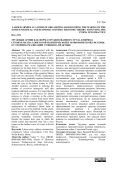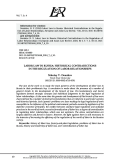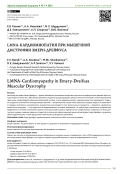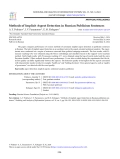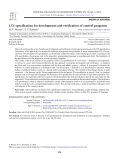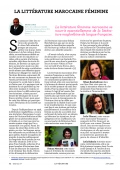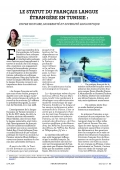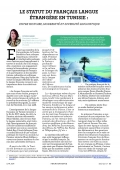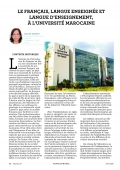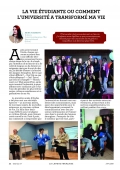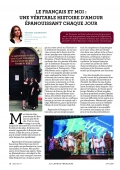The development of contemporary digital technologies leads to a profound modification of human intelligence. The authors assume that this modification should be studied by means of a special kind of phenomenology. It is digital phenomenology which examines the structures of consciousness of the modern technogenic subject. This builds on their previous works where the authors have already discussed a theory of the transformation of human intelligence driven by digital technologies. The influence of these technologies results in virtualization of affect. Affect becomes detached from its local manifestation in the human body and is manifested in material and energetic processes in digital infrastructure. As a result, space and time, categories of reason, and productive imagination become aspects of mobile devices and digital infrastructure. The aim of this contribution is to discuss the possibilities of digital phenomenology in the study of communication of the technogenic subject. Methodologically, the study refers to the phenomenological approach. Archetypes are compared of classical intelligence and technogenic subjectivity which defines the content of communication. The authors suggest that consciousness as a pure orientation can undergo digital modification, as the world of primordial objects is discovered through corporeal experience. A modern human body is not constituted within the boundaries of direct sensual experience but perceives digital devices as body organs. The peculiarities of the language of these devices determine human linguistic practices as well. So we can see non-human intelligence and non-human communication. Both intelligence and communication are becoming increasingly artificial. The prospect of further in-depth research in the digital humanities is outlined.
The paper is concerned with the prerequisites of the creation of the labour armies during the Civil War in Soviet Russia (1917-1921), the main functions and results of these armies’ operations. The conclusion is made that labour armies were an imminent part of military communism, they never happened to be employed as the Red Army’s reserve but as a tool of militarizing the country’s economy and policies. The evolution of the organized labour units took two directions. Firstly, standardized units were being gradually organized instead of numerous and miscellaneous detachments that made the core of the labour armies in 1920. Another tendency consisted in reducing the number of excessive managerial staff that required additional resources. It is noted that the massive use of the armed forces for labour purposes is always a reaction to the critical situation in which a country finds itself, when neither political nor economic challenges can be responded to by standard means. Thus, the employment of militarized labour units at peacetime can never be justified. On the whole, labour armies proved effective as an emergency means of tackling economic problems and ensuring immediate economic operations. Despite the limited time span in which the labour armies had operated, they left a clear impact on the further course of events in Soviet Russia.
The aim of the work is to study the main patterns of the development of labor law in Russia in their problematic key. A conclusion is made about the presence of a number of general trends in the development of the branch of law. Pre-revolutionary and Soviet legislators formed strategic concepts and individual judgments in the legal regulation of labor relationships. At the same time the genesis and development of this branch of law were characterized by a number of destructive foundations that are inherent to particular systems and historical periods. Such ‘genetic’ problems are: laws making the legal regulation of work susceptible to the influence of the political environment; periodic evasion by legislators of the objective economic principles; the conflict between standard legal regulation and unlawful practices in the world of work; excessive formalization of labor law; a degree of centralization in regulating labor relationships, which was not optimum. The above contradictions are largely objective and forced in nature. However, the fight against them is still necessary in the interests of increasing the efficiency of the regulation of the world of labor in the Russian society.
Мышечная дистрофия Эмери-Дрейфуса — редкое заболевание, возникающее вследствие генетического дефекта белков ядерной оболочки, чаще эмерина и ламина А/С. Заболевание проявляется медленно прогрессирующей слабостью лопаточно-плечевой и тазово-перонеальной групп мышц, миодистрофией, первичной контрактурой суставов, а также кардиомиопатией с нарушениями ритма и проводимости. Сердечно-сосудистые осложнения и жизнеугрожающие аритмии — основная причина смерти таких пациентов в молодом возрасте. В зависимости от ведущих симптомов и наследственного анамнеза больные попадают в поле зрения разных клиницистов — неврологов, кардиологов, аритмологов, ортопедов, — часто недостаточно информированных о данном заболевании, что препятствует диагностике, своевременной профилактике и лечению осложнений. В данной статье рассмотрены данные эпидемиологии, патофизиологии, особенности течения, диагностики, подходы к ведению сердечно-сосудистой патологии при прогрессирующей мышечной дистрофии Эмери-Дрейфуса с развитием LMNA-кардиомиопатии. А также представлен клинический случай данного заболевания.
Статья продолжает цикл публикаций по разработке и верификации управляющих программ на основе LTL-спецификаций специального вида. Ранее для описания строго детерминированного поведения программ была предложена декларативная LTL-спецификация, проработаны способы её верификации и трансляции: для верификации используется инструмент проверки модели nuXmv, трансляция осуществляется в императивный язык программирования ST для программируемых логических контроллеров. При верификации декларативной LTL-спецификации поведения программ может возникнуть необходимость в моделировании поведения её окружения. В общем случае требуется обеспечить возможность построения замкнутых систем «программа-окружение». В настоящей работе для описания поведения окружения программ логического управления предложена LTL-спецификация ограниченно недетерминированного поведения булевой переменной. Данная спецификация позволяет задавать поведение булевых сигналов обратной связи, а также условия справедливости для исключения нереалистичных сценариев поведения. В статье предлагается подход к разработке и верификации программ логического управления, в рамках которого модель поведения окружения программы описывается в виде ограничений на поведение её входных сигналов, что позволяет избежать отдельного детального представления процессов функционирования окружения. В результате полученная модель поведения замкнутой системы «программа-окружение» даёт ряд преимуществ: упрощение процесса моделирования, сокращение пространства состояний проверяемой модели, снижение времени верификации. При невозможности сведения поведения окружения к поведению имеющихся входных сигналов данный подход предполагает применение «мнимых» датчиков - дополнительных булевых переменных, использующихся как вспомогательное средство для описания поведения входных сигналов. Цель введения мнимых датчиков состоит в компенсации недостающих датчиков для отслеживания специфического поведения отдельных элементов окружения, которое необходимо учесть при задании реалистичного поведения входов программы логического управления. Предложенный подход к разработке и верификации программ с учётом поведения окружения (объекта управления) демонстрируется на примере промышленной установки для литья пластмасс.
Настоящая работа продолжает цикл статей по разработке и верификации управляющих программ на основе LTL“=спецификации. Суть подхода заключается в описании поведения программ с помощью формул линейной темпоральной логики LTL специального вида. Полученная LTL“=спецификация может быть непосредственно верифицирована с помощью инструмента проверки модели. Далее по LTL“=спецификации однозначно строится код программы на императивном языке программирования. Перевод спецификации в программу осуществляется по шаблону. Новизна работы состоит в предложении двух LTL“=спецификаций нового вида - декларативной и императивной, а также в более строгом формальном обосновании данного подхода к разработке и верификации программ. Выполнен переход на более современный инструмент верификации конечных и бесконечных систем - nuXmv. Предлагается описывать поведение управляющих программ в декларативном стиле. Для этого предназначена декларативная LTL“=спецификация, которая задаёт размеченную систему переходов как формальную модель поведения программы. Данный способ описания поведения является достаточно выразительным - доказана теорема о Тьюринг“=полноте декларативной LTL“=спецификации. Далее для построения кода программы на императивном языке декларативная LTL“=спецификация преобразуется в эквивалентную императивную LTL“=спецификацию. Доказана теорема об эквивалентности, которая гарантирует, что обе спецификации задают одно и то же поведение. Императивная LTL“=спецификация транслируется в императивный код программы по представленному шаблону. Декларативная LTL“=спецификация, которая подвергается верификации, и построенная по ней управляющая программа гарантированно задают одно и то же поведение в виде соответствующей системы переходов. Таким образом, при верификации используется модель, адекватная реальному поведению управляющей программы.
La littérature féminine marocaine se nourrit essentiellement de la littérature maghrébine de langue française.
Dans cet article, il s’agira d’aborder l’apparition de la langue française en République du Bénin, ainsi que des facteurs qui ont facilité son installation. Pour ce faire, l’article débutera par l’histoire de l’apparition et de l’installation de la langue française et se terminera par les défi s qui s’imposent à cette dernière dans les conditions culturelles, socio-politiques et même géopolitiques d’aujourd’hui. Une attention particulière sera accordée non seulement aux langues locales, mais aussi à la langue anglaise qui, grâce à la mondialisation, occupe une place de plus en plus importante dans la sous-région ouest-africaine.
Le français langue étrangère occupe une place particulière en Tunisie, mêlant l’héritage historique de la colonisation française, les exigences de la modernité et la diversité linguistique propre au pays.
l’article traite de l’enseignement du français à l’Université marocaine
l’Université n’est pas seulement un lieu où j’ai obtenu mon diplôme et mes connaissances, elle est pour moi une école de vie grâce à laquelle je suis devenue plus forte.
Le français est bien plus qu’une langue pour moi, c’est une passion, une source d’inspiration et une véritable histoire d’amour qui continue de grandir et de s’épanouir chaque jour davantage.

